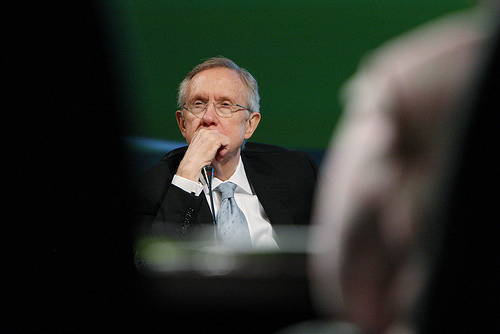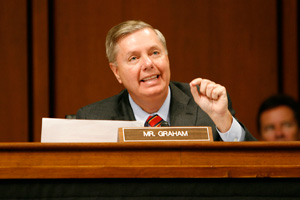There’s a lot to process in Ryan Lizza’s epic New Yorker piece about the demise of the climate bill in the Senate. Among the more interesting elements are the extensive efforts to court Lindsey Graham (R-SC) and the pursuit of additional Republican votes in order to get the White House to even pay attention to the bill. Specifically, the piece claims that at some point there were at least five likely Republican supporters.
I’m more than a bit incredulous about this claim. After all, the main sources for the piece are the offices of Lieberman, Graham, John Kerry, and mostly unnamed White House officials, and it always seem to me that there was more hype than actual hope in their public claims about how far along they were in winning support for the bill. And already one of the Republicans the piece claims was ready to jump on board, Florida’s George LeMieux, says that this wasn’t exactly the case. LeMieux tweeted yesterday:
NewYorker piece is wrong. Care about energy indep, but never favored cap & tax– would cost Florida familes 30% ^ in energy costs.”
Here’s the key passage on LeMieux from Lizza’s piece:
Shortly before Thanksgiving, George LeMieux, of Florida, approached Graham in the Senate gym and expressed interest in joining K.G.L. “Let me teach you something about this town,” Graham told him. “You can’t come that easy.” Graham was trying to give the new senator some advice, according to aides involved with the negotiations: LeMieux would be foolish to join the effort without extracting something for himself.
But LeMieux didn’t have the chance to try that, as he soon became another casualty of Republican primary politics. He had been appointed by the Florida governor, Charlie Crist, who was then running in a tight Republican primary for the seat against another Tea Party favorite, Marco Rubio. LeMieux couldn’t do anything that would complicate Crist’s life. In a private meeting with the three senators in December, he told them that he couldn’t publicly associate himself with the bill. But, according to someone who was present, he added, “My heart’s with you.”
Now, I have no doubt that the three leads on the climate and energy package were aggressively pursuing LeMieux’s vote, as well those of Susan Collins and Olympia Snowe of Maine and Scott Brown of Massachusetts. They had no choice but to, given that several Democrats were already written off as “no” votes. And I have no doubt that LeMieux’s heart really was with them. But he was never actually going to vote for the bill; the party was united behind Minority Leader McConnell in opposition. With Graham’s encouragement he might have worked behind the scenes to get more of his priorities into the bill, but politically he was never actually going to put himself on the line and vote for it.
This is pretty much the key element to this entire piece: No amount of deal-making on this bill was ever going to convince Republicans that it was to their political advantage to work with Democrats on this. Even Graham’s support was always tenuous at best, and he never seemed to bother trying to understand why climate change was even an issue in the first place. (David Roberts at Grist also has an excellent post on the subject of the Senate’s overall ignorance on the issue up today.) And even as the senators turned their attention to getting industry support behind the bill, it was highly unlikely to change the minds of any Republican senators. And because the Senate requires 60 votes to pass anything, a handful of senators control the entire debate—and in this case, the debate happens to be of monumental consequence.
But that’s the story of what went wrong here, in a nutshell: The GOP had a greater political agenda in mind, and compromise and courtship were never going to change that.














